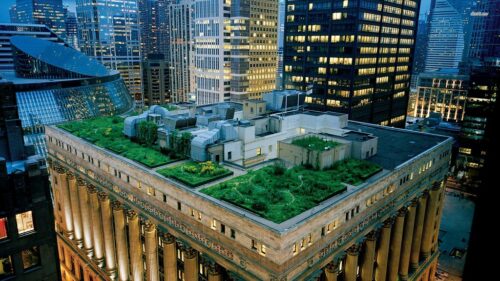Green roofs, roofs covered in plants, could help cool cities.
As the world population increases, the need for urban infrastructure also increases. Human activities, coupled with rising global temperatures, result in a phenomenon known as an urban heat island: a city that is significantly warmer than surrounding rural or suburban areas. Urban heat islands can have detrimental effects on the environment and humans. Many cities have implemented green infrastructure such as green roofs—roofs covered with plants—to address the rising temperatures. It is easy to assume that all green roofs are equally beneficial, but there are many different types of green roofs with varying degrees of effectiveness. Yale researcher Kathryn McConnell investigated a low-cost method of evaluating them.
McConnell measured the effectiveness of three green roofs in Chicago: a Walmart Supercenter rooftop, City Hall’s rooftop, and Millennium Park, a large public park on top of various parking garages and a railyard. The green roofs varied in their plant species composition, and thus also the amount of soil and irrigation required. Data from the satellite Landsat 5, which is public information, was used to evaluate the changes before and after green roof installation by recording the Land Surface Temperature (LST) and normalized difference vegetation index (NDVI). This was done at each green roof and at a nearby rooftop to ensure that no other variables were affecting the LST.
“People tend to think that all green roofs have cooling effects,” McConnell said. But her findings indicated that not all green roofs have a cooling effect on the environment and that the effect varies by type. Green roofs with a greater diversity of species, with deeper soil and irrigation requirements, tended to be more cooling.
Policymakers and planners now have a low-cost method of evaluating the effectiveness of green roofs in their city, which they could use to adjust city plans and create a better environment for their residents.

